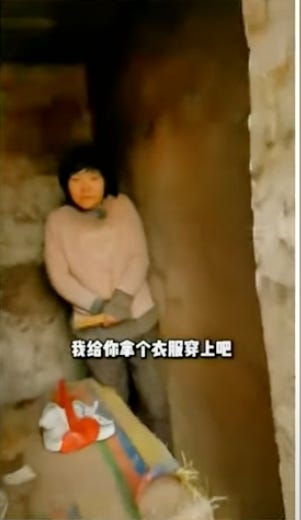Bromance and Hegemony
Undoubtedly bigger than the Olympics itself – is anyone watching? – Putin in Beijing and the resulting manifesto for a new world order is prime time viewing this week.
If you have the patience, here is the some-6,000-word Joint Statement of the Russian Federation and the People’s Republic of China on the International Relations Entering a New Era and the Global Sustainable Development • President of Russia.
As one Tweet comment put it:
According to reports, Lü Xiang, a research fellow at the Chinese Academy of Social Sciences, told the state tabloid Global Times that it was first time that the two governments have expressed a common position in writing on all “the major issues and strategic questions.”
The “unprecedented” bilateral cooperation would have broader geopolitical significance since they are the only countries powerful enough to oppose Washington, Lü is reported to have said.
“The solidarity between China and Russia gives a new definition to the world order, as they share common knowledge about where the major threats to global stability come from,” Lü Xiang told the Global Times.
You got gas?
Gazprom PJSC and Rosneft PJSC signed agreements with China, the world’s largest energy consumer as Putin and Xi pumped hands in Beijing, “united by political, military and economic frictions with Europe and the U.S.”, reports Bloomberg.
Amid concerns Moscow may attack neighboring Ukraine, the U.S. and Europe are considering sanctioning Russian energy and metals projects, as well as banks and sovereign debt. Enter concerns that Russian gas deliveries could be cut off as tensions with the West accelerate Russia’s “Pivot to Asia.”
“During Putin’s visit to Beijing, Gazprom signed its second long-term gas deal with China National Petroleum Corp. Under the agreement, the producer will deliver 10 billion cubic meters per year over 25 years via a new pipeline from Russia’s Far East,” Bloomberg reported.
Other news
Hong Kong’s Omicron panic continues despite its zero-Covid policy, with Reuters reporting that Hong Kong residents are raiding supermarket shelves. Hong Kong imports 90% of its food supplies – mostly from China, especially fresh food – and some cross-border truck drivers are testing positive.
Hong Kong respiratory specialist Leung Chi-chiu told broadcaster RTHK that Hong Kong may see over 10,000 new cases a day in two weeks’ time, if the pandemic is not brought under control, resulting in a “tsunami-like outbreak.” Just 22 percent of people over 80 in Hong Kong are double-vaccinated and only half of those between the ages of 70 and 79 are vaccinated at all, notes the South China Morning Post.
Sneezing hamsters are not thought to be the source of this latest Covid-19 surge.
The president of George Washington University in D.C. reversed a decision to remove campus posters by Australian-based Chinese artist Badiucao, protesting Beijing’s so-called Genocide Olympics.
You can purchase your own Badiucao BOYCOTT BEIJING 2022 artwork (among other artwork by the artist) by visiting his website. Badiucao’s work has been shunned for years due to pressure from Beijing.
The agony and the ecstasy of sport and social media … Agony if you’re China’s U.S.-born figure skater Zhu Yi, who took a fall (twice). The misadventures were trounced as a “disgrace” by Weibo users, who asked why the US-born skater was chosen over a Chinese-born skater, Bloomberg reports.
… Ecstasy (for the moment), if you’re Eileen Gu, another naturalized Chinese from the U.S.
Arguably, the Chinese internet has been broken for a long time, but the Associated Press reports that when Gu won gold on Tuesday, the servers of Sina Weibo, the massive Twitter-like social network, found its servers temporarily overloaded and China’s internet collapsed.
The Economist’s 1843 has a thoughtful piece about Gu’s allegiances:
As her classmates fretted over sophomore prom and physics tests, Gu agonised about which superpower to represent in the 2022 Olympics. It was, in part, a question of identity for the American girl raised in San Francisco by two strong Chinese women, her mother and grandmother, in the absence of her American father. Gu had always lived happily on the hyphen. “When I’m in the US, I’m American,” she has said. “When I’m in China, I’m Chinese.” But the 15-year-old now felt that she had to choose between her two identities, and between two countries locked in a trade war and an ideological struggle.
Gu’s decision can’t have been an easy one and it will engender troublesome questions for her for years to come:
Also huge on Chinese social media – it’s been a week, ChinaDiction can’t ignore it any longer.
It starts with a short viral video of a mother of eight chained in an outdoor shed – and basically doesn’t get any better from there.
The purported maker of the video claimed to want to show the “positive energy” of an impoverished father living in a village “and struggling to provide for his mentally-ill wife, eighty-year-old mother, and eight children ranging in age from twenty-three to two years old,” reports What’s on Weibo.
In fact, and somewhat unbelievably, the father, Dong Zhimin, had even received government assistance and numerous charitable donations according to the What’s on Weibo report.
This, his video short, however, backfired. Well, kind of. Maybe. It’s complicated.
In short, an outraged internet galvanized the CCP worthies of Feng County (that’s in Jiangsu Province, if you’re wondering), into action, and they announced the chained mother of eight had been diagnosed with schizophrenia and was hospitalized and receiving treatment. Her husband, who had achieved some local fame, launched his own online channel and went into marketing. China’s Weibo reportedly remains, en masse, unconvinced that the issue has been resolved satisfactorily.
For the full story, with all its Byzantine twists and turns – and general insanity – read the entire thing here.
Book review: Red Roulette
It’s topping the lists of talked-about China books this year – and what impeccable timing, arriving amid what we’re all starting to call the Red New Deal, which is reigning in private education, gaming, real estate, the titans of tech, a full-blown attack on the rampant jungle of Chinese capitalism. In short, ChinaDiction had to read Red Roulette.
Let it be said: it’s a bit painful at the outset if you’ve read more than, say, a dozen other China books because we get prepped with all the usual: the Cultural Revolution, Tiananmen, the hardships of the pre-Deng days etc. Desmond Shum’s revelations about himself could be cut back – do we need to know his first drink made him feel more sociable? – and the early descriptions of Whitney, his ex-wife, make her sound like a superwoman combination of Song Meiling, Susan Sontag and Ayn Rand.
ChinaDiction thinks there’s a limit to how many times the word “guanxi” should be used in any book about China, but then again guanxi is really what Red Roulette is all about. Everyone at the table is there because they lied, borrowed vast sums of money to keep up appearances and zealously flattered anyone who mattered – the rest are genuine celestials, beyond mere money because the entire realm is their’s. It’s a despicable cast of characters in a country where windfalls are to be wallowed in before the tides of good fortune turn.
Coda
Tragically, in a country in which censors are as scarce as professional tap dancers, an overworked censorship worker has dropped dead:
The “content moderator'“ allegedly dropped dead of a brain hemorrhage while working a Lunar New Year holiday shift at Bilibili, a short-video-content platform. “Discussions about the employee’s death were prohibited not only inside the company but also on its platform,” reports SupChina. There is still no mention of the death on Bilibili, in what those aware of the issue on Chinese social media think is possibly the work of overworked Bilibili censors.
Quick update. I thought this was fake news at first, but it appears that Bilibili really will be hiring another 1,000 censors in the year ahead so there are no more deaths due to overwork












